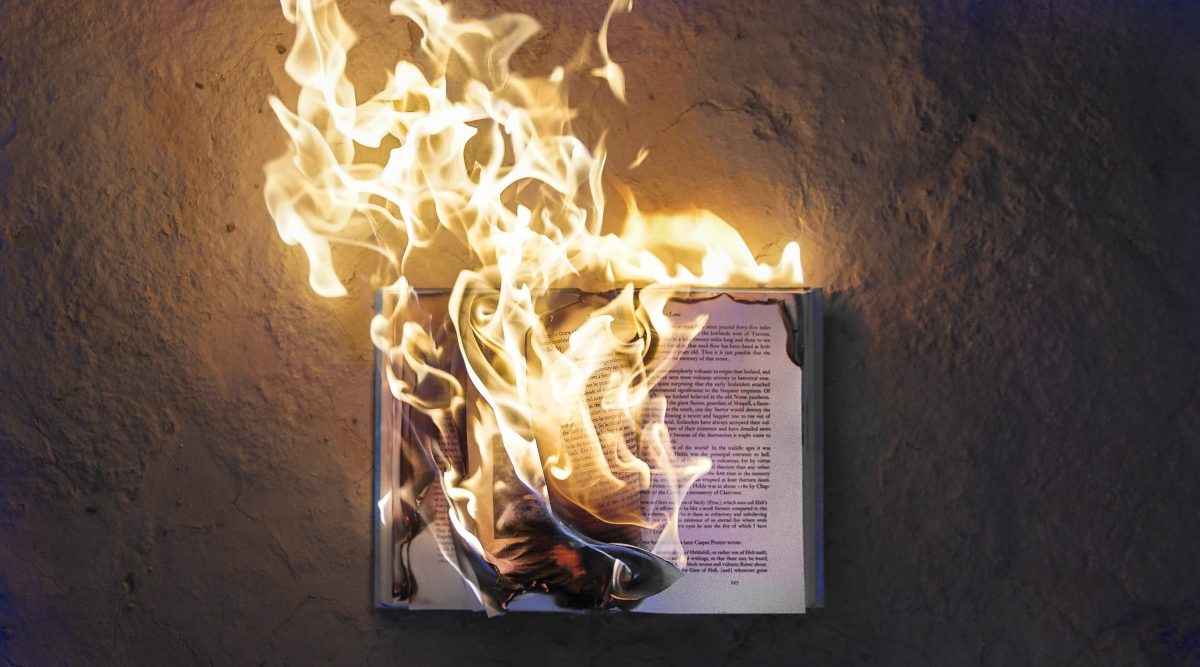Why are we still banning books and protesting Drag Story Time?

Image by Freddy Kearney via Unsplash.
From William Shakespeare to Margaret Atwood, censoring literature has a long history. Books, publications, and media are censored for a variety of reasons, including profanity, sexual content, and, most commonly, for opposing dominant ideological beliefs.
Many works we now regard as classics were at one time challenged, banned, or burned. King Lear was banned during the reign of King George III, who experienced periods of madness. In 1931, the Chinese province of Hunan banned Alice in Wonderland because “animals should not use human language and [because] it was disastrous to put animals and humans on the same level.” In 2019, Americans demanded that Atwood’s The Handmaid’s Tale — which has its own long history of controversy and censorship — be removed from public libraries due to profane language and “sexual overtones.”
A more visceral form of censorship is found in book burnings. In 1932, James Joyce told an American publisher that “some very kind person” bought and subsequently burned a first edition of Dubliners. The following year, one of the most infamous book burnings in history occurred in Nazi Germany. A variety of “un-German” books from Germans such as communist founder Karl Marx and social critic Thomas Mann, along with undesirable “foreign influences,” including Ernest Hemingway and Helen Keller, were burned “to bring German arts and culture in line with Nazi goals.”
Dr. Pearce Carefoot contends that the “first serious efforts” at censoring printed materials in Canada happened during World War I. The War Measures Act (1914) enabled the government to censor, control, and suppress certain “publications, writings, maps, plans, photographs, communications, and means of communication.” It was likely an attempt to limit pro-German propaganda.
Despite societal advancements in human rights and liberties, over 100 years later we are still faced with attempted censorship. Banning and censoring literature, publications, and media fosters ignorance and hostility in society and creates a skewed education for new generations by restricting certain ideas, identities, and beliefs.
In summer 2022, heated debates arose regarding the banning of books from the Chilliwack School District. Several board of education trustees advocated for the removal of books with inappropriate content. One of the books in question was All Boys Aren’t Blue by George M. Johnson, an award-winning Black non-binary author, writer, and activist. The book is a series of personal essays detailing their experiences growing up as a Black queer youth in America, discussing a wide range of topics including gender identity, consent, and toxic masculinity.
In an interview with the Gay and Lesbian Association Against Defamation, Johnson explained that they knew the book could be controversial. “I told my team very early on that I knew that this book at some point would get banned simply because I knew that the content that was in the book was something that we hadn’t seen much of … [which is] what the Black queer experience looked like.”
As public debate continued, Trustee Darrell Furgason sent a letter to the Chilliwack Progress in response to the controversy. He stated that “no trustee, teacher, administrator or librarian should have the freedom to place books in our district school libraries that contain depictions of sex acts.” He then continued to argue that fellow-Trustee Willow Reichelt “has no right … to promote any sexual practices whatsoever in the school district, even if they are practised by the LGBTQ community.”
A similar attempt at censorship occurred this January when protestors gathered outside the Coquitlam Public Library during Conni Smudge’s Drag Queen Story Time. Smudge has been holding these events at libraries in British Columbia for over a decade. While one protestor in a Global News video yelled that the story time was “child abuse,” hundreds of people came to support Smudge and the story time. For Smudge, these events are intended to help children embrace themselves and each other. “I think this lights up the world to let everybody know they can be exactly who they wanna be,” Smudge said. Similar events across North America have also been met with heavy protest.
Whether it is removing books from libraries or canceling Drag Queen Story Times, censoring certain perspectives, identities, and beliefs creates an ignorant and uneducated society that negatively affects ourselves and future generations. These acts of censorship are attempts to shelter people, often children and youth, from certain ideas and ways of life, which often comes at the expense of the LGBTQ+ community. It is as if critics believe that banning certain books will somehow eliminate them from society. As George M. Johnson said, “There is a great fear of what happens if this new generation actually operates with the truth.”







